7 Key Insights on Can Dogs Have Cinnamon Safely
Overview
As a loving pet owner, you may wonder about the safety of certain spices for your furry family members. Good news: dogs can enjoy cinnamon in moderation, especially the Ceylon variety, which is gentler compared to the Cassia type. It’s essential to introduce this spice gradually and monitor your dog for any adverse reactions.
Cinnamon isn’t just a flavorful addition; it also offers potential health benefits. This spice boasts anti-inflammatory properties and can help regulate blood sugar levels, provided it’s given in appropriate amounts. Imagine the joy of supporting your dog’s health with a simple spice!
At Adventure Den, we understand your desire to create a nurturing environment for your pets. By incorporating safe and beneficial ingredients like cinnamon, you can enhance their well-being. So, why not consider adding this delightful spice to your dog’s diet? Your furry friend deserves the best, and we’re here to support you every step of the way.
Introduction
In the world of pet care, many owners are increasingly concerned about the dietary needs of their beloved dogs. As devoted pet lovers strive to enhance the health of their furry family members, the introduction of spices like cinnamon has sparked interest due to its potential benefits. However, the journey to safely incorporating cinnamon into a dog’s diet demands thoughtful consideration and education.
Understanding the health advantages it offers while recognizing the risks associated with improper use is essential. This article delves into the essentials of cinnamon for dogs, providing practical tips on safe introduction, dosage recommendations, and emphasizing the importance of consulting with veterinarians.
By navigating this flavorful addition with care, pet owners can ensure their dogs enjoy the perks of cinnamon while prioritizing their safety and well-being.
Adventure Den: Vancouver’s Premier Dog Daycare for Safe Cinnamon Treats
At Adventure Den, we are devoted to creating a secure and stimulating environment for your furry family members. This makes us the perfect place for pet owners to explore safe dietary practices, including the question of can dogs have cinnamon and the thoughtful use of spices. Our facility prioritizes personalized care, ensuring that every dog enjoys a nurturing experience that extends to their dietary needs.
Adventure Den is not just about fun and exercise in our expansive play areas; we also actively educate pet owners on safe treat options. While certain spices can provide health benefits, it’s essential to consider if can dogs have cinnamon and incorporate them carefully and in moderation. We want to remind you that xylitol is toxic to dogs, and it’s best to avoid giving it to them, along with spice oils, which can also be harmful. Furthermore, while discussing what spices are safe, you may wonder, can dogs have cinnamon? We offer guidance on how to safely introduce spices like nutmeg into your dog’s diet, helping you make informed choices. Here are some practical tips for introducing this spice safely:
- Begin with a small quantity to observe for any negative reactions.
- Consult with a veterinarian before adding new spices to your dog’s diet.
- Avoid cinnamon oil and xylitol entirely.
As small animal veterinarian Jnanee Krishnasamy emphasizes, understanding the right way to introduce spices is crucial for your dog’s health. With a strong focus on safety and advanced security features, Adventure Den stands out as a trusted resource for pet owners who wish to enhance their pets’ well-being through proper dietary practices. Together, we can ensure a happy and healthy journey for your beloved companions.

Cinnamon’s Health Benefits: Anti-Inflammatory and Antioxidant Properties
Cinnamon is a powerhouse of antioxidants and has notable anti-inflammatory properties, raising the question of whether can dogs have cinnamon as a valuable addition to their diet. These properties can significantly benefit canines, particularly older ones or those with issues like arthritis, leading to questions about whether can dogs have cinnamon to assist in reducing inflammation and discomfort. Additionally, this spice has been demonstrated to help control blood sugar levels, which is essential for preserving overall well-being, especially in dogs prone to diabetes, leading to the inquiry of can dogs have cinnamon. It also supports cardiovascular health and aids digestion, making it a versatile component for enhancing canine wellness.
Veterinary insights highlight the significance of gradually incorporating cinnamon into your dog’s diet to explore whether can dogs have cinnamon, allowing you to observe your pet’s reactions attentively. As Lynn Guthrie, a writer and pet owner, wisely reminds us, “Keep in mind that this article is meant to be educational and shouldn’t be used as a replacement for professional medical or dietary advice.” Research has emphasized the spice’s potential in reducing inflammation, demonstrating its efficacy in promoting joint wellness. For instance, studies suggest that small quantities of cinnamon can be added to meals as a rare indulgence, offering both taste and wellness advantages.
The Adored Beast group, composed of compassionate animal care specialists, emphasizes the importance of understanding if and how can dogs have cinnamon safely integrated into their diet. Adding this spice not only provides wellness benefits but also serves as a delightful treat. You can store cinnamon-infused dog biscuits in an airtight container for up to two weeks, ensuring freshness and convenience. By understanding and applying the wellness advantages of cinnamon, you can enhance your pet’s well-being while enjoying the rewarding experience of pampering your furry friends.

Risks of Cinnamon for Dogs: Toxicity and Allergic Reactions
When considering if dogs can have cinnamon, it’s important to note that it can be safe in small quantities, but excessive consumption poses significant health risks. If your furry family member consumes large amounts of this spice, they may experience symptoms such as vomiting, diarrhea, and hypoglycemia. In certain situations, anti-nausea medication may be necessary if a dog has ingested large quantities, especially if they show signs of distress. As a caring pet owner, it’s crucial to stay alert and observe your pet for any negative reactions when introducing this spice into their diet, emphasizing moderation to avoid potential health issues.
Veterinary guidance highlights the importance of caution, as specific spice-flavored products, like applesauce with cinnamon, often contain elevated sugar levels and possibly harmful components such as xylitol or nutmeg. While allergic reactions to this spice are not very common, they can occur, making it essential for pet owners to be mindful of their dog’s unique sensitivities. As Anna Burke wisely notes, ‘To summarize, yes, dogs can have cinnamon in limited amounts, but it isn’t essential or advised.’ This reinforces the idea that moderation is key for your beloved companions.
Facilities dedicated to pet safety, such as Adventure Den, emphasize the significance of recognizing food hazards, ensuring that dogs can enjoy a secure and healthy environment. By informing pet owners about the dangers associated with certain spices and contrasting them with other common harmful seasonings, such as nutmeg and garlic powder, Adventure Den plays a vital role in helping you make informed dietary choices for your furry friends. Remember, your pet’s well-being is a priority, and together we can create a nurturing environment for them.
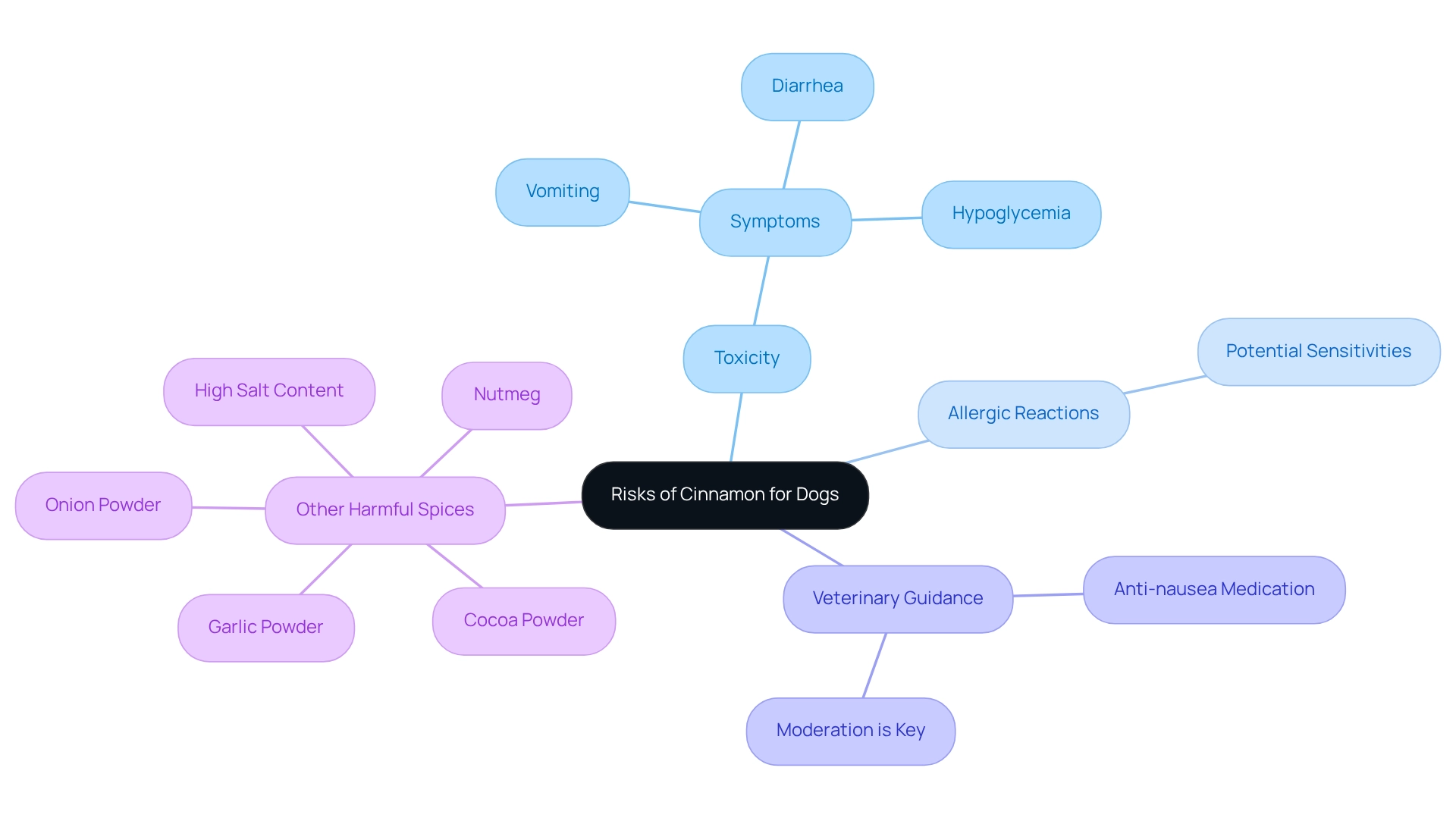
How to Safely Introduce Cinnamon to Your Dog’s Diet
When considering if dogs can have cinnamon, it’s important to safely incorporate spice into your furry family member’s diet by starting with a small amount—about 1/8 teaspoon for small dogs and up to 1/2 teaspoon for larger breeds. Blend it into their regular food or treats to help them get accustomed to the new flavor. Pay close attention to your dog for any signs of discomfort or allergic reactions during this adjustment period. If all goes well, you can gradually increase the amount.
It’s advisable to choose the Ceylon variety, which is considered safer than the Cassia type due to its lower coumarin levels, thus reducing the risk of adverse effects. Additionally, be mindful that inhaling spice powder can cause difficulty breathing, coughing, and choking, so always handle it with care. As Lexie Alpeter wisely notes, “As long as you provide your dog the appropriate quantity of spice, it can assist in keeping your dog healthy and content, leading to the question: can dogs have cinnamon?”
By following these gentle guidelines, you can ensure a positive experience as you enhance your dog’s meals with this spice. In the case of excessive consumption, it’s crucial to know the necessary steps to take, as highlighted in the case study on emergency response to spice ingestion, which emphasizes the importance of prompt veterinary care. By adhering to these practices, you can safely introduce this spice into your dog’s diet, nurturing their health and happiness.
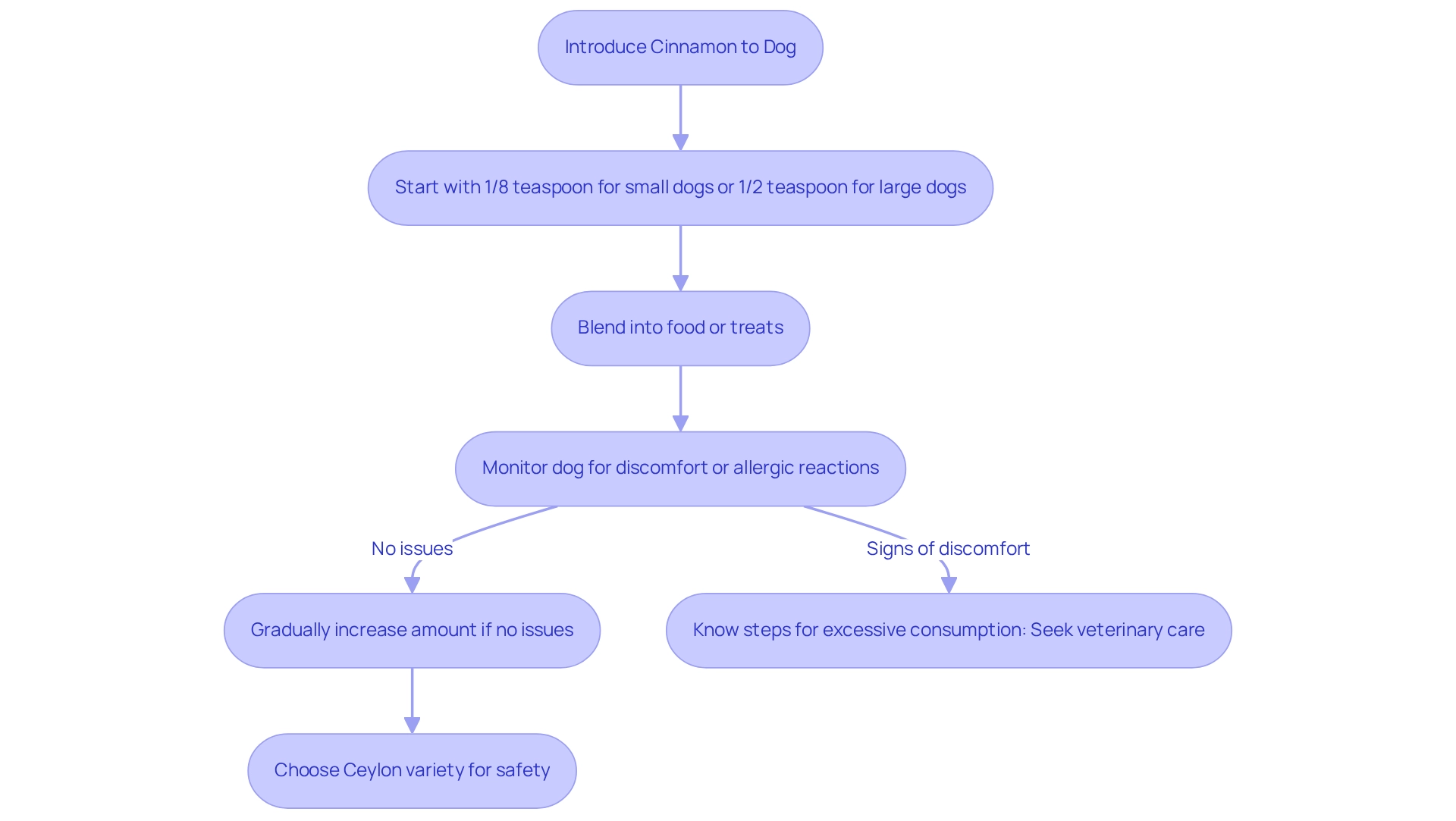
Recommended Cinnamon Dosage for Dogs: Finding the Right Amount
Establishing the right cinnamon dosage for your furry family members is essential, especially when asking can dogs have cinnamon, and it varies based on their weight.
- For small canines weighing under 10 pounds, a pinch to 1/8 teaspoon is recommended.
- Medium-sized canines, weighing between 10 and 20 pounds, can safely enjoy approximately 1/4 teaspoon.
- Larger dogs, particularly those over 50 pounds, may tolerate up to 1/2 teaspoon.
It’s vital to introduce this spice gradually, starting with smaller amounts, and closely observe your dog’s reaction to ensure their safety and comfort. This careful approach helps avoid any potential negative impacts while allowing you to appreciate the benefits of this dietary supplement.
However, it’s important to remember that Cassia spice contains higher levels of coumarin, leading to concerns about whether can dogs have cinnamon if consumed in excess. Therefore, consider this spice as a supplement rather than a primary treatment for health conditions.
As Boulder Veterinary Hospital wisely advises, “That’s why it’s crucial to consult your vet before making any changes to your pet’s diet.” A case study on incorporating this spice into dog diets highlights practical methods for adding it to meals while emphasizing the importance of proper dosing. By nurturing your pet’s health with informed choices, you can create a loving environment where they thrive.
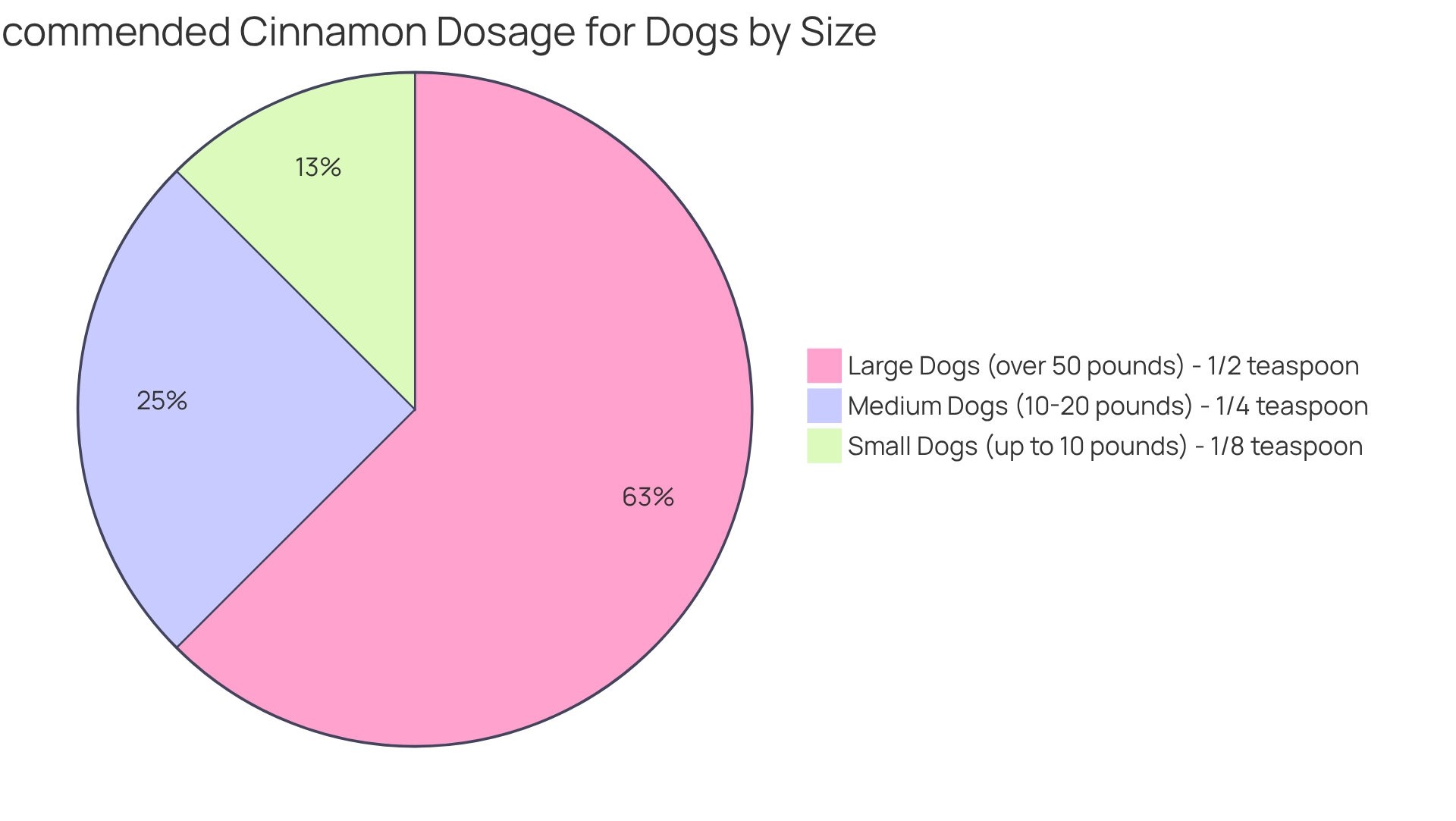
Common Myths About Dogs and Cinnamon: Debunking Misunderstandings
Many pet owners worry about whether can dogs have cinnamon or if certain spices are safe for their beloved dogs. It’s important to understand that when given in moderation, this spice is considered non-toxic, leading to the question of whether can dogs have cinnamon. However, not all varieties are the same; for example, the Cassia type has higher coumarin levels, which can be harmful in large quantities, leading to concerns about whether can dogs have cinnamon. Recognizing this distinction is crucial for pet owners, as it emphasizes the need to choose the right type of spice for their furry family members.
Unfortunately, some pet owners mistakenly believe that all forms of this spice are safe for dogs. Educational campaigns that dispel these myths are essential for fostering safe dietary habits. For instance, case studies show that while this spice can be beneficial, it leads to the question of can dogs have cinnamon, as it should be included in dog-specific treats rather than human baked goods, which may contain harmful ingredients. It’s also vital to note that no research has yet confirmed the health benefits of this spice for dogs, which raises the question of whether can dogs have cinnamon; while potential advantages exist, they remain unverified. Veterinary insights further support the notion that this spice can offer health benefits, such as helping to regulate blood sugar levels and providing antioxidant properties. As Lexie Alpeter points out, this spice may assist in lowering high blood pressure and combating fungi, among other benefits. However, if you suspect your dog has ingested something harmful, it’s always best to consult a veterinarian. By addressing these misconceptions and sharing accurate information, pet owners can confidently add this spice to their dogs’ diets, allowing them to enjoy its advantages while minimizing risks.
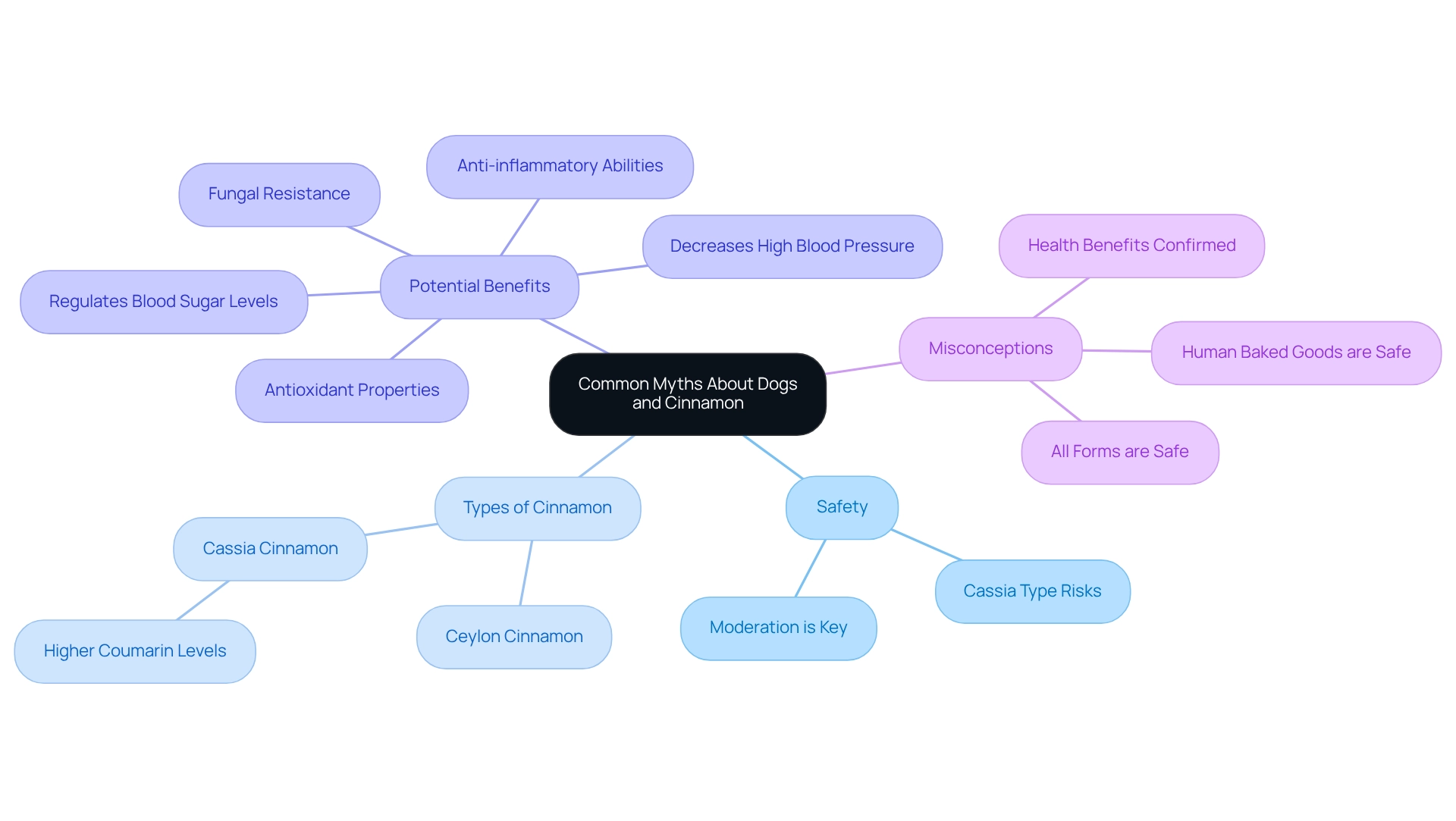
Consult Your Veterinarian: Importance of Professional Guidance
Before introducing any new supplement into your dog’s diet, it’s essential to consult your veterinarian. They offer personalized guidance tailored to your dog’s medical history, dietary needs, and any existing conditions. This professional advice not only empowers you to make informed decisions but also prioritizes your dog’s well-being and safety. After all, a veterinarian is like a trusted doctor, providing a 100% unconditional guarantee that your pet will never have a bad day—a testament to the reliability of their expertise.
Consider the gradual incorporation of seasonings like nutmeg, which veterinarians frequently recommend to minimize any potential wellness risks. Dr. Leon Whitney, in his case study titled “Ethical Obligation in Veterinary Medicine,” highlights that caring for animals is a fundamental aspect of the veterinary ethical code. This reinforces the importance of consulting these professionals for dietary guidance.
As Dr. Marty Becker aptly puts it, “Veterinarians are the unsung heroes of our society,” emphasizing their vital role in pet care. By relying on veterinary expertise, you can confidently navigate dietary adjustments, ensuring your furry family members enjoy a safe and healthy diet. Remember, your pet’s health is worth the extra step of seeking professional advice.
Safe Spice Alternatives for Dogs: Beyond Cinnamon
When you’re looking for safe spice alternatives to cinnamon for your beloved dog, consider introducing turmeric and ginger into their diet. Turmeric is celebrated for its anti-inflammatory properties, which can support joint function and overall well-being. On the other hand, ginger is well-known for its digestive benefits, helping to alleviate nausea and promote gastrointestinal health. Remember to introduce ginger gradually by mixing it with their food, and opt for fresh or powdered forms—steering clear of syrup or candied varieties due to unhealthy sugars. As Hannah Shepherd, a qualified registered veterinary nurse, wisely advises, if any symptoms arise after your dog consumes ginger, please discontinue its use and consult a veterinarian for a thorough evaluation.
Additionally, parsley acts as a natural breath freshener, while basil adds flavor without health risks. These spices not only make mealtime more delightful but also enhance your dog’s nutritional intake. For instance, large canines can safely enjoy up to 3/4 teaspoon of fresh ginger, making it a wonderful option to elevate their meals. By thoughtfully incorporating these spices, you can create a flavorful and healthful dining experience for your furry family member.
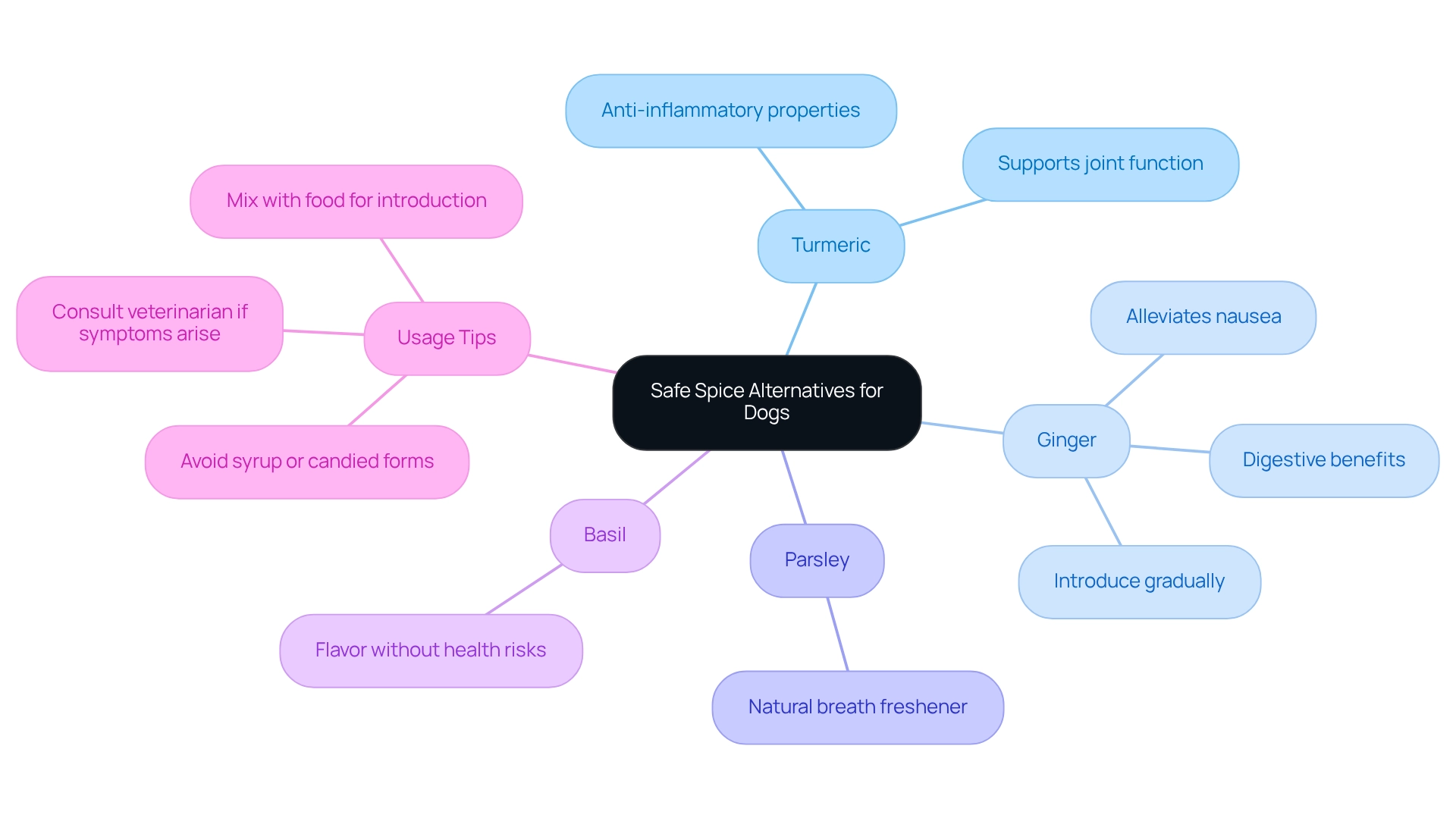
Recognizing Cinnamon Toxicity: Symptoms to Watch For
While this spice is often considered safe for your furry family members in small amounts, it’s vital for pet owners to be vigilant about potential signs of toxicity and to understand if can dogs have cinnamon. Symptoms of spice poisoning can appear as:
- Vomiting
- Diarrhea
- Coughing
- Difficulty breathing
- Irregular heart rates
Veterinary expert Lexie Alpeter shares, “I aim to be a reliable source, blending experience with a dedication to the well-being of pets,” underscoring the importance of recognizing these symptoms early for effective treatment. For instance, an excess of this spice can lead to serious health issues, making immediate veterinary consultation essential if any of these symptoms arise after consumption.
Statistics reveal that toxicity from this spice is not uncommon, with numerous cases linked to human foods high in fats, sugars, and harmful ingredients like xylitol and chocolate. In fact, studies show that a significant percentage of canines displaying toxicity symptoms have ingested such foods. A notable case study illustrates the dangers of spiced pastries, leading to the question of can dogs have cinnamon, as small amounts of the spice may be beneficial but pose considerable risks due to their overall composition. Pet owners are strongly encouraged to refrain from giving their dogs these treats and to watch closely for any adverse reactions.
Veterinary responses to toxicity symptoms can vary, yet they often involve prompt evaluation and treatment options to mitigate risks to your pet’s well-being. In summary, being aware of the signs of spice toxicity—such as vomiting, diarrhea, and respiratory distress—can help ensure timely veterinary intervention. Furthermore, pet owners should supervise their dog’s diet carefully and seek guidance from a veterinarian if they suspect their pet has ingested a certain spice or foods containing it, safeguarding their dog’s health and welfare.

Monitor Your Dog’s Reaction: Ensuring Safe Cinnamon Consumption
Incorporating spice into your dog’s diet can be a thoughtful decision, but it’s essential to closely observe their behavior and overall health. Watch for signs of discomfort, such as changes in appetite, lethargy, or gastrointestinal issues. As Ross Martin, an insurance writer, wisely notes, “Whining or wincing is a sign that your dog is in distress.” By being vigilant, you can swiftly identify any adverse reactions, allowing for timely dietary adjustments. This proactive approach not only helps ensure your furry family members’ safety but also answers the question of whether can dogs have cinnamon, allowing them to enjoy its potential benefits without negative side effects.
Pet owners often monitor their pets’ responses to new foods, observing any unusual behaviors or symptoms. These observations can offer valuable insights into their dietary tolerances. Additionally, adjusting a dog’s diet can prevent excessive weight gain and joint strain, highlighting the broader implications of dietary changes. Veterinary advice emphasizes the importance of observing dogs after any dietary changes, reinforcing that attentive monitoring is key to maintaining their well-being. Remember, by nurturing your dog’s health, you are creating a loving and supportive environment for your beloved pet.

Conclusion
Incorporating cinnamon into your furry family member’s diet can offer numerous health benefits, but it requires thoughtful consideration and moderation. The potential advantages of this spice, such as its anti-inflammatory properties and ability to regulate blood sugar levels, make it an appealing addition for many pet owners. However, it is vital to understand the risks associated with excessive consumption, including symptoms of toxicity like vomiting and diarrhea.
To safely introduce cinnamon, consider the following steps:
- Start with small amounts.
- Consult with your veterinarian.
- Monitor your dog’s reactions closely.
This approach not only prioritizes your dog’s health and safety but also allows you to enjoy the positive aspects of adding this flavorful spice to their meals. Additionally, being aware of the types of cinnamon used and avoiding harmful ingredients like xylitol is crucial in ensuring a safe dietary experience.
Ultimately, the journey of incorporating cinnamon into your dog’s diet should be a thoughtful one, guided by professional advice and a commitment to monitoring their well-being. By following recommended practices and remaining vigilant, you can enhance your dog’s diet while minimizing potential risks, ensuring that your beloved pet enjoys the benefits of cinnamon in a safe and healthy way.
Frequently Asked Questions
Can dogs have cinnamon?
Yes, dogs can have cinnamon in small quantities, but it is important to introduce it carefully and in moderation to avoid potential health risks.
What are the health benefits of cinnamon for dogs?
Cinnamon has antioxidant and anti-inflammatory properties, which can benefit dogs, particularly older ones or those with conditions like arthritis. It may help control blood sugar levels, support cardiovascular health, and aid digestion.
What should I consider before adding cinnamon to my dog’s diet?
Before adding cinnamon, consult with a veterinarian, start with a small quantity to observe for any negative reactions, and avoid cinnamon oil and xylitol entirely, as they can be harmful to dogs.
What are the risks of giving dogs too much cinnamon?
Excessive consumption of cinnamon can lead to symptoms such as vomiting, diarrhea, and hypoglycemia. If a dog ingests large amounts, anti-nausea medication may be necessary if they show signs of distress.
Are there any specific products I should avoid when giving cinnamon to my dog?
Yes, be cautious with spice-flavored products, like applesauce with cinnamon, as they may contain elevated sugar levels and harmful components such as xylitol or nutmeg.
How can I safely introduce cinnamon into my dog’s diet?
Introduce cinnamon gradually by starting with a small amount and monitoring your dog’s reactions. Always consult with a veterinarian before making dietary changes.
What alternatives should I avoid in addition to cinnamon?
In addition to avoiding cinnamon oil and xylitol, pet owners should be cautious with other harmful seasonings such as nutmeg and garlic powder.
Where can I find more information on safe dietary practices for dogs?
Adventure Den offers resources and guidance for pet owners on safe dietary practices and the careful introduction of spices into their dogs’ diets.


